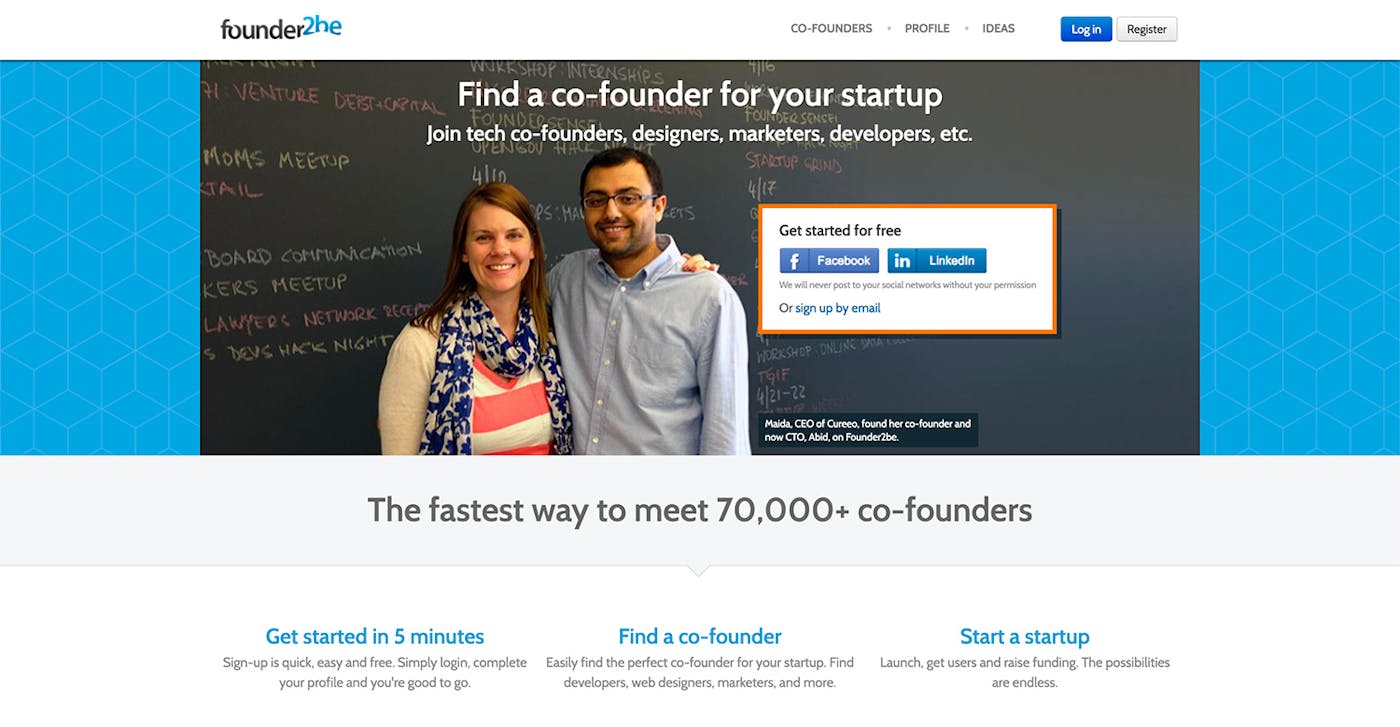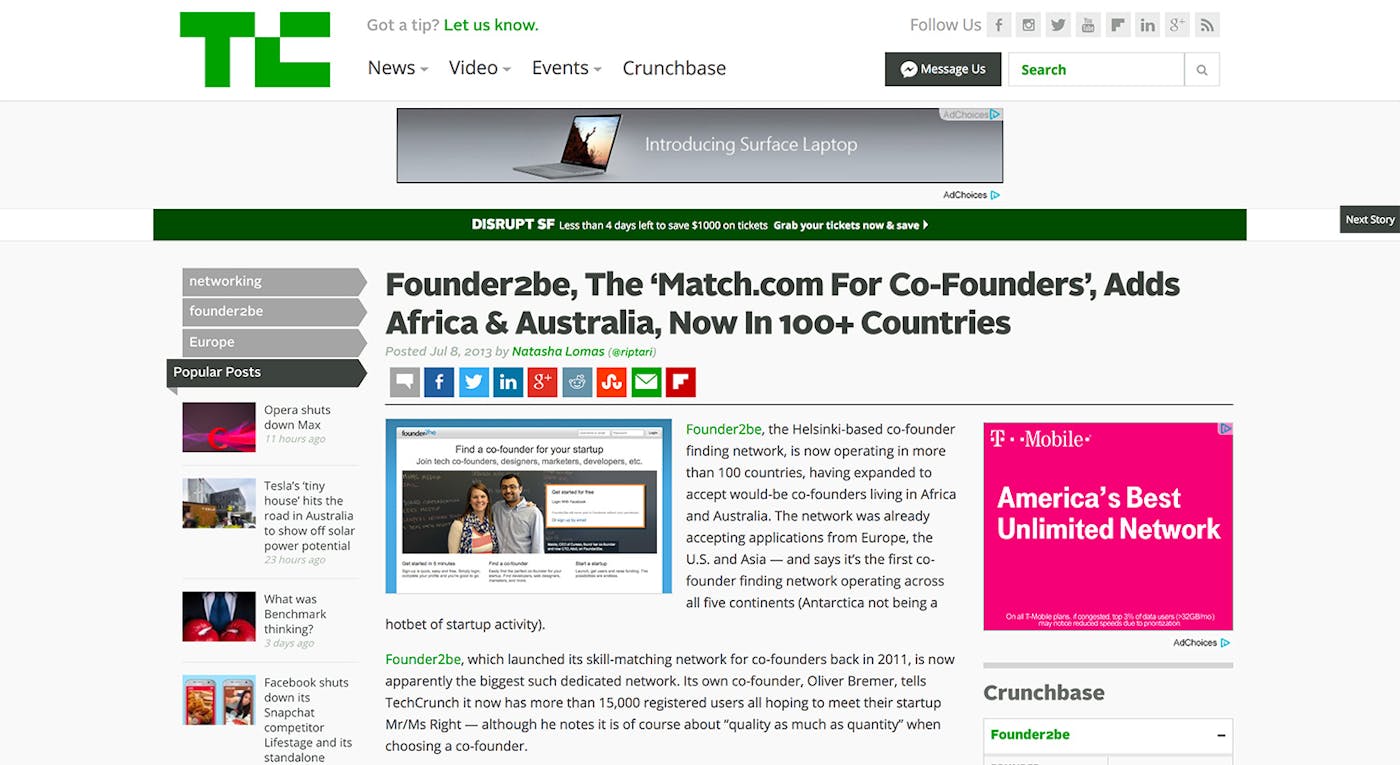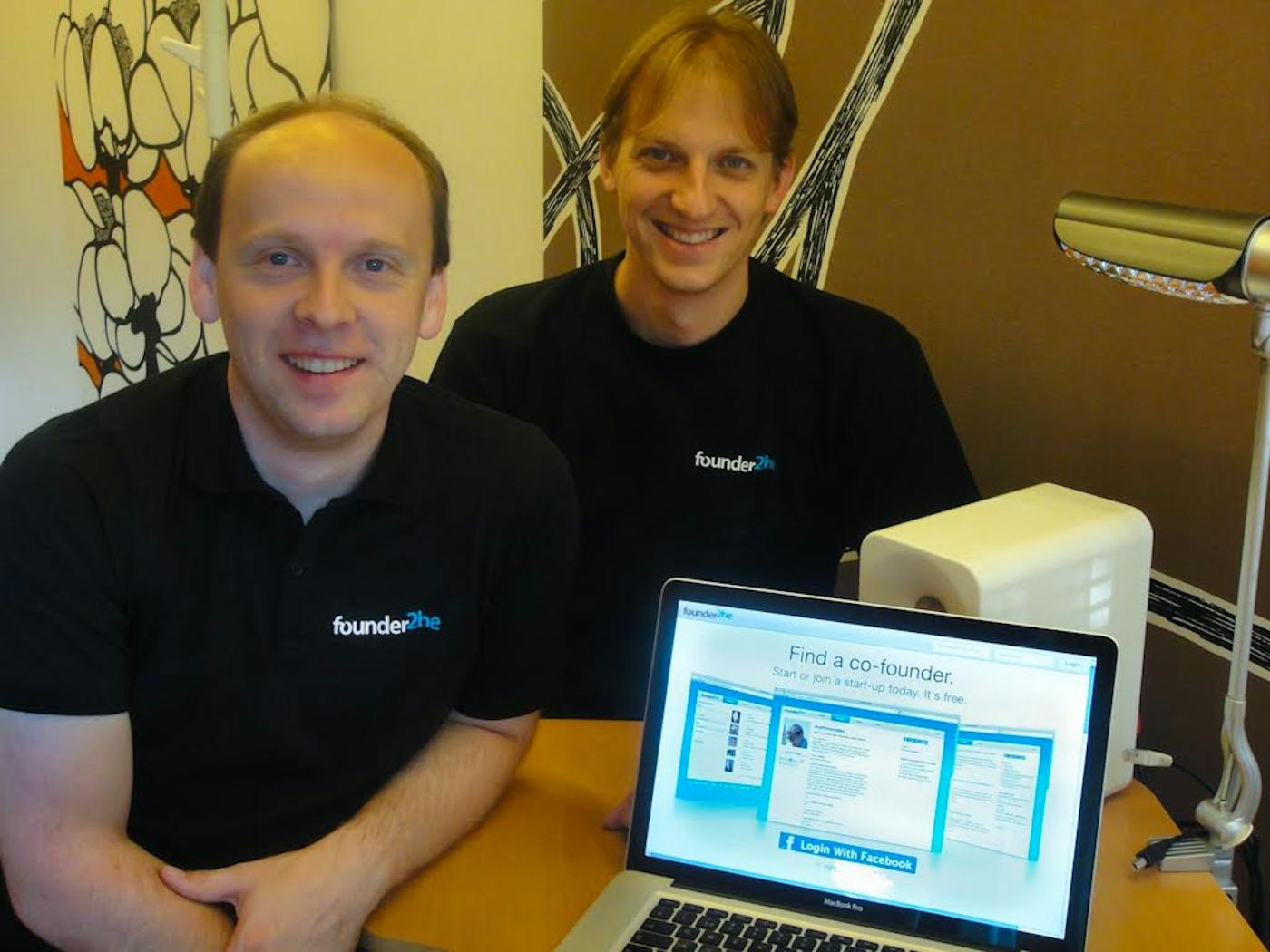Building a Co-Founder Dating App to Solve My Own
Problem
Hello! What's your background, and what are you working on?
Hello! My name is Oliver Bremer. I'm working on Founder2be — the original co-founder matchmaking service — together with my co-founders Frank and Wolfgang.
I grew up in Germany, got my master's in computer science in the U.S., and then moved to Finland, where I started at Nokia (back then the #1 cell phone maker in the world). Seven years later, the day I held the first iPhone in my hands, I did two things:
- I bought Apple shares.
- I quit my job.
Both turned out to be pretty good decisions.
Next, I joined a tech startup, which got me thinking about solving problems in new ways. Soon I had all sorts of ideas for a startup of my own. All I needed was a co-founder. And so the idea for Founder2be was born: online dating for co-founders.
Today we're making around $2,000/month from people finding co-founders in 100+ countries.

What motivated you to get started with Founder2be?
I had plenty of ideas for startups, but I didn't want to start alone. With every new idea, I asked friends and co-workers to join me. Unfortunately, nobody I asked ever wanted to jointly found a startup around any of my ideas.
And if nobody that I already knew wanted to team up, what chance did I have of finding great co-founders I didn't yet know? This was about the time I had my eureka moment: Having met my girlfriend through online dating I thought: "Hey! I'll just build a dating website where I swap male/female for developer/designer/growth hacker, and that's how co-founders will meet."
I again asked all my friends if anyone would like to co-found my co-founder dating website idea. Most thought I had gone completely nuts. The most common response? "You can't start a company with someone you don't know." Luckily, one of my friends thought the idea was much better than anything else I had pitched at that point. And that's how Frank and I got started.
Lesson learned #1: When someone says, "This will never work," it only means, "I don't know how I would make this work myself."
Don't let anyone stop you from turning your dreams into reality.
We didn't do much validation. The very existence of online dating was enough validation for us. If two strangers can meet, marry, and start a family, then surely two strangers will be able to meet, discuss ideas, and start a company.
I later found out that Dropbox's Drew and Arash hadn't known each other before starting together. They'd met for a coffee at MIT before deciding to build Dropbox together. I cold emailed them, and Arash responded, telling me that it was Justin from Justin.tv who had introduced them.
At the end of 2010, I quit my job at the startup I had joined after Nokia. Apple's share price had doubled since then, which provided the runway. (I know: APPL tripled again since!) I guess you can say Steve Jobs funded our startup. :)
What went into building the initial product?
When we started, I decided we would launch within one month. Frank thought I was crazy, but I was keen to get our service in front of users as fast as possible. Truth be told, we missed our self-imposed deadline by one day and launched on February 2nd.
At launch, we knew some big features were missing. We were worried to launch with such a bare bones product. But as the saying goes, "If you're not embarrassed when you launch, you didn't launch early enough."
And embarrassed we were.
The first users' main complaints were about the exact features they thought we should have. The good news: this validated what we should focus on next. It took us another three weeks to build those features.
We also didn't have a way for people to share their business ideas until a few months later. I figured nobody would want to share their ideas for fear of others stealing them, so I never implemented a feature supporting this use case. Now I laugh about it.
Luckily, Frank insisted that we at least try. He reasoned that if nobody used our sharing feature, we could simply remove it. And people did share their ideas. In hindsight this isn't really a surprise. Ideas are extensions of yourself: what you want to do, what you care about, the problems you want to solve.
Needless to say, I'm happy I listened to my co-founder here.
Lesson learned #2: The only way to tell if something will work is to try. Even if you don't think it can work, give it a shot. You might be surprised.
How have you attracted users and grown Founder2be?
Our biggest concern at launch wasn't a lack of features, but a lack of content. A matchmaking website without potential matches isn't very appealing, is it?
Ours had three profiles: Frank, my brother Wolfgang (whom we recruited to help with design), and me. And none of us were looking for co-founders. We were focused on Founder2be.
A Scandinavian tech blog covered us for our launch, and we gave early members free premium subscriptions. By "free premium", I mean they got all the features for free. (Note that we didn't yet have the means to charge anyone anyways, so in truth we had no other option but to give everything away for free.)
Our early users taught us a lot about what people really wanted, which helped us to figure out what we could charge for.
Over time we tried to get coverage from the big blogs as well: TechCrunch, Mashable, etc. To our surprise, the biggest question we ever got was, "How much money did you raise?" Zero. We didn't raise a round. We didn't want to. And without a round, people didn't want to write about us. It was weird. Money was all that mattered. I understand revenue matters to investors. But why investment is the most important thing to a blogger? That's beyond me. (So I think it's extra cool that you guys at Indie Hackers care about what people build, and that you ask us what's going on under the hood and why. Kudos to you!)
The funny thing is that when we stopped trying to get coverage, we suddenly got Techcrunch'ed. What does it feel like? Good! We made as many sales on that day as we had the previous month. Did it last? Not really. Don't spend your time running after investors or bloggers. Focus on your product instead. Listen to your customers. Like Paul Graham says: "Build a product people actually want."

If you do, good things will follow. If you don't, nobody will be interested anyways.
As people started to hear about Founder2be following the press exposure, a couple of interesting things happened:
- A lot of people contacted us saying, "I've had the same ideas as you for such a long time. It's awesome you build this service so I don't have to."
- There was an overwhelming response from people wanting to join and help us build the community. Initially, we didn't know what to do with all the help we were offered. (We didn't really need more developers and designers.)
It took us a while to figure out how to channel it best. The answer? Meetups. We started with volunteers from all around the world who held meetups in different cities to connect co-founders. It really took off, and before we realized it we had meetups hosted on every continent. Chinedu and Emeka, our ambassadors in Nigeria, even made it to the cover of Forbes Africa.
It's really hard to say what will work and what won't. My advice is that you never know until you try. Something might sound great but not work. Something else might sound silly but turn out to be a hit. The only way to find out is do it.
Lesson learned #3: "Ideas are worthless. Execution matters."
What's your business model, and how have you grown your revenue?
We run on a freemium model, as I mentioned before. The free tier provides all the basic features you need, and the premium tier is designed to help co-founders save time and find suitable matches faster. We complement that with sponsorships in our newsletter.
We've done a few small experiments with pricing, but these haven't changed the big picture. Higher prices and fewer people buy; lower prices and more people buy. The sum in the end has pretty much been the same.
The only regret I have from our launch is not charging people earlier. In the beginning we had no paid option. Everything was free. It took us a long time to finally "dare" to charge. And when we did, the first payments didn't take long to come in. It's exactly like you commented in your interview with Cronitor: "There are very few good reasons not to start charging immediately."
And now we're around $2,000/month.
What are your goals for the future, and how do you plan to accomplish them?
We want to make finding the perfect match even easier. Just like dating, it usually takes a few dates before you meet someone where you think, "Hey, this could be the one." So we want to minimize the amount of "dates" it takes before you find this person.
Revenue-wise, of course — more is always better. And that's where we aim. We don't have a concrete dollar figure we want to hit by a certain date. Rather, we have our goals in terms of how many features and experiments we want to test each month and measure if they make things better. When something makes things better for our users, we'll keep it. Otherwise, we'll remove it again.
I also think we could do even more by finding the right partner for Founder2be itself: a company that benefits from more people starting businesses and those businesses succeeding (generating revenue and charging customers). So, we're definitely open to exploring collaboration and acquisition as well.
What are the biggest challenges you've faced? Obstacles you've overcome? If you had to start over, what would you do differently?
We started out dirt cheap. I think the first two years, we ran our entire service on a $10/month shared web host. At one point, our site became incredibly slow and we started having downtime. We ended up scrambling to move everything to bigger servers. I think being frugal is good when you start a business, but next time around I'd probably be slightly less stingy.
The bigger our entrepreneurial community grows, the more interesting it becomes, and not only for those looking for co-founders, unfortunately. We started seeing cases of individuals reaching out to members to sell services. So we were forced to take action and implement a spam reporting system and block accounts.
One morning, we also had a spammer flood our service with "startup ideas" that were ads for a moving service. We played cat and mouse for a few days taking down his account, just for a new one to pop up. Ultimately, we made idea-sharing posts a feature of our premium plan, which not only stopped the spammer but also increased revenue.
I believe every problem presents an opportunity. When a problem first arises, you think, "Oh man, not this, not now." And then you start solving it. And you learn, and you fix it, and you move on to the next problem. Being an entrepreneur is all about serial problem solving.
What were your biggest advantages? Was anything particularly helpful?
That's a great question. Meeting my girlfriend through online dating certainly helped. That was the spark for the solution to our problem: "How do I meet people I don't know?" That's not a unique starting point though. Lots of people met through online dating before. And I wasn't the first to think of the solution either, as evidenced by the amount of messages from earlier users who had the same idea.
In the words of writer William Gibson, "The future is already here — it's just not very evenly distributed." Realizing the problem had been solved already in online dating, we "just" applied it to a new domain.
Being a little naive also helped. If anyone starting out with a new business thought about all the things that could — and probably would — go wrong, nobody in their right mind would start.
Lesson learned #4: "You're in business when you have a problem you can solve, others have the same problem, and they're willing to pay for your solution."
Another thing that helped a lot was my love of traveling. It made me fairly outgoing. I hadn't always been like that. It's something that can be learned.
So get outside of your comfort zone. Expose yourself to opportunity. Go to events where you don't know who you'll meet. The odds that someone interesting will walk into your office or home are much lower than the odds that you'll meet someone interesting at an event.
Through literally random introductions I met people like Carly Chamberlain, one of the first employees of Airbnb, John Sechrest, a Startup Weekend board member, and many others. One of the things John kept saying was, "Oliver, you need to charge people."
I only wish I had listened sooner. Just going out with an open mind is the most rewarding action you can take.
I think the biggest advantage anyone can have is to simply start acting on their ideas. If you start, you've already made it further than 99% of people. Fear of failure is why ideas die.
What's your advice for indie hackers who are just starting out?
I am big fan of Startup School by YCombinator. If you're already up and running with a first version of your product, Dave McClure's Startup Metrics for Pirates is a must.
If you're still thinking about getting started, then in my experience the biggest obstacle is not knowing where to start. The fear that your idea or project might not work out. My advice for anyone thinking about making the leap is to alleviate your fears by asking yourself: "What is the worst thing that can possibly happen if I don't succeed?"
Will you be homeless? Will you have to go hungry? Probably not. The worst that might happen is you run out of money and have to move in with a friend or your parents. You can always update your CV, get another job, save up again, and start over. Once you realize the worst that can happen isn't that bad, you can put that thought aside and start doing.
Just do it. Like the Nike slogan. Stop worrying and start doing. And when you do, remember:
- Don't let anyone tell you it can't be done. When someone says, "This won't work," it really only means they don't know how they would make it work.
- Charge customers early on. Don't wait until your product is "good enough" to be worth paying for. Leave that decision up to your customers. What's the worst that can happen? Nobody pays. Most likely this won't happen. And if it does, that's not bad either. It's the best indication to move on and try something else.
- Don't be shy about reaching out. Seek out mentors. Learn from others. Even if you think someone is "too famous" to be contacted. We are all just humans made out of flesh and blood. People feel humbled being asked for advice.
Where can we go to learn more?
You can give Founder2be a try by signing up at founder2be.com. In our newsletter we share tips on how to find a co-founder, pitch your ideas, and get started. You can also get in touch with us on Twitter.

Please feel free to ask questions in the comments. I'll be there answering as many as I can. Thanks for having us on Indie Hackers, Courtland!

Great idea... Just signed up :)
Excellent read :) I'm about to launch my first venture tomorrow :) :)
Great content. Thank you !
This comment was deleted 5 years ago
This comment was deleted 5 years ago